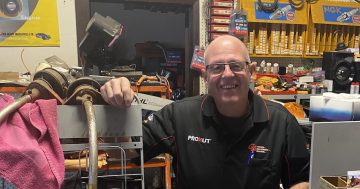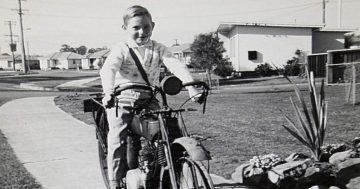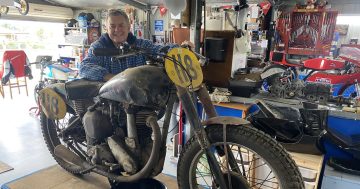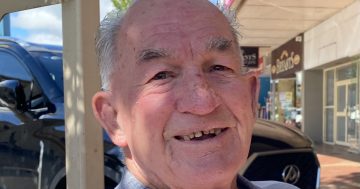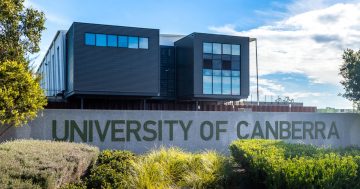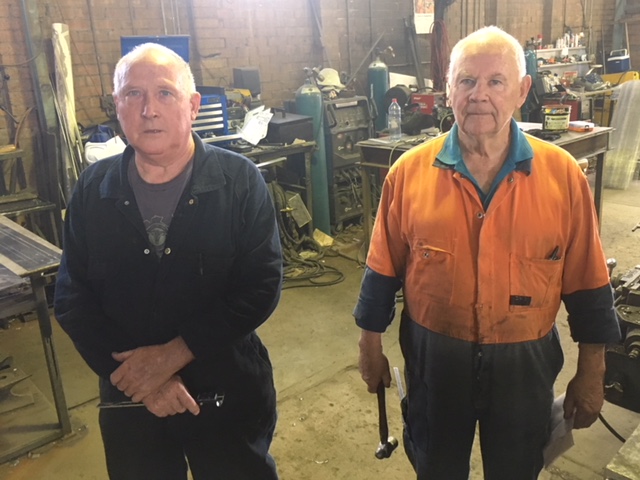
Rob Wallace and Brian Mills in one of the workshops at Goulburn Engineering. Photo: John Thistleton.
Huge quarries, construction and the railway keep Goulburn’s engineering workshops busy these days in a cut-throat industry. Not that long ago, Goulburn Engineering owner Rob Wallace almost went broke. A competitor was under-cutting him on every job. “I don’t know whether it was him, but some of his employees quite plainly said they were going to send Goulburn Engineering broke – well they nearly did. Because they were quoting, quoting, quoting cheaper, we couldn’t get a job,” he says.
“Only trouble was, he sent himself broke before he broke me,” says Rob. “He took all the council work, he just took everything, because he’s got the gift of the gab, and I haven’t. I’m not comfortable in those situations.”
Recalling this takes Rob further back in time. “When I was a kid, Dad invented a machine for unloading superphosphate from trains – a truck-mounted grab with a turntable that you would back up to the rail wagons, then a scoop came down and they would unload the rail wagons,” he says.
Called a Pelican, the machine well rewarded Bob Wallace, who founded Goulburn Engineering, until a Melbourne businessman found a similar machine just invented in New Zealand. He patented both machines.
“The guy in New Zealand and Dad had to pay him royalties for every machine they manufactured, and any machine they made afterward he had to be paid a royalty.” That almost sent his father broke.
“Dad had to meet him at Bermagui. My brother and I were only little, we all drove down and here is this bloke, he had been out game fishing, and there’s all these marlin and bloody great tuna on this boat and poor old Dad said, ‘Well kids I have paid for that’.’’
Bob Wallace founded the business. Following a five-year tool-maker’s apprenticeship at Cockatoo Island, he enlisted in the air force – giving his occupation as a wood carter from Braidwood, even though he had never carried a stick of firewood in his life. (A tool maker was a protected occupation during World War II). He became a navigator on bombers, was shot down in France, rescued by the French Resistance and escaped through Spain to England. After the war, he helped ferry military aircraft around the world until 1946 when he started Goulburn Engineering in Auburn Street.
The workshop shifted to North Goulburn (later Kermac Engineering), to Bradley Street and to its present North Street site in 1968. Two years later Rob began his apprenticeship as a fitter and turner, a trade that continues to stimulate his mind. “I enjoy the challenge of working out how to fix things, how to make them work. It is not about money. That’s why I’m still on the tools, you work out how are we going to make that conveyor, how are we going to make that smashed machine work again, how are we going to keep that bloke in business,” he says.
“And it is not always about money, people won’t do a job where you spend an hour on it and get $20,” he says. “And I don’t mind.” An old fireplace grate, an ornate, century-old hand pump for a well, or a replacement part for a big machine made overseas keep first-class machinists, boilermakers, welders and three apprentices busy in the workshop. At its peak, 30 people worked there. Today 20 people, including Brian Mills – who will turn 80 this year and has never worked anywhere else – tinkering, twisting and manufacturing things, turning over $3.5 million annually.
Goulburn has lost many of the big industries that once kept the workshop busy, like the Sirdar wool factory, brickworks, brush factory, wool scour and sale yards.
“The sale yards used to bring in a lot of people, they would come in on sale day and drop their jobs off and pick them up next time,’’ says Rob, who has spent years modernising equipment.
“We had to diversify. We make a lot of hydraulic cylinders that go all over Australia, we get a lot of work from outside the area now, ” he says. When running the wool scour, Howard Kneebone often engaged Goulburn Engineering to instal equipment. After the scour’s closure, Mr Kneebone was on a project using a Queensland power station’s warm water to convert algae into a fuel, and engaging Goulburn Engineering to manufacture much of the equipment.
Once the workshops collaborated with other like-minded operators such as Nell Engineering and Barry Bright. “She’s a whole different ball game now, she is pretty cut-throat,” says Rob. “It is also cut-throat with staff because there are no tradesmen. No one is employing them, and the kids don’t want to do it, I mean they get no money for the first couple of years. It’s hard. It’s hot. School teachers and parents for the last 40 years have told the kids, ”go to university”. We have an archeologist working here because she cannot get a job. My son has been to university and he has only just got a job.’’
Promising young staff are lured to higher paying, easier jobs elsewhere.
“You can’t blame them, “ says Rob. “If they can get a job at a mine, they are paid well, they have good conditions. They don’t actually work, contractors do all the crap jobs. In government jobs, they get a pay rise every year and they are not covered in grease and crap. We lost a really good young bloke, Chris Taylor, he was poached for (Canberra’s National Science and Technology Centre) Questacon. He’s an engineer.’’
Nevertheless, he continues employing apprentices. He reckons some school teachers look down on trades, or under-value them, even though they remain essential.
Rob has been unable to expand the business in recent years. Attempts to re-locate to South Goulburn have been set aside over planning issues with Goulburn Mulwaree Council. The workshop continues apace, with the beeping of reversing trucks mingling with phones ringing, calls over the public address, laughing, banter and banging of tools on metal.












